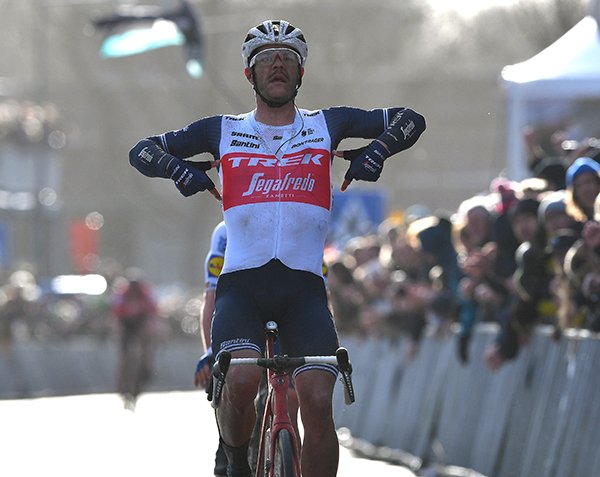The Mental Challenges of Restarting the Pro Cycling Season

July 31, 2020
The Trek-Segafredo pro cycling team had a flying start at the beginning of this season until it all came to a halt due to coronavirus. With all the races dropped from the calendar and the uncertain times that followed, the mental challenge to keep the spirit alive was tough for both staff and riders. We spoke to Josu Larrazabal, head of performance for the team, on how difficult it was to keep the morale high during lockdown and what kind of new challenges lie in wait for the riders in the upcoming second part of the season.
A flying start
Larrazabal has worked for the team since 2013 and takes care of all the multidisciplinary work for the staff and riders. In addition to a group of seven riders he coaches directly (both men and women), the Spaniard also coordinates and leads a group of coaches, doctors and the nutritionist.
Last season the team scored some good results with a victory in the Giro d’Italia and with Bauke Mollema winning Il Lombardia, one of the five Monuments of cycling. Add in Mads Pedersen winning the World Championships, the team has the coveted rainbow jersey in its armada as well.
This year the team put in a great effort during the winter to keep their momentum going and succeeded, achieving a double victory in the Tour Down Under with Richie Porte and Ruth Winder, Jasper Stuyven winning the opening of the Classics campaign in De Omloop and a fourth place overall in Paris–Nice by none other than Vincenzo Nibali.
The Italian star joined Trek-Segafredo this year and has a huge impact on the team, according to Larrazabal. “Putting him together with Porte and Mollema means you can cover every single stage race of one week or even a Grand Tour with certain guarantees of a good result.” The ‘Shark of Messina’ has a rich palmares, including winning the Tour de France and the Giro d’Italia (twice!) and is considered as one of the biggest fish in the peloton.

The challenges during the lockdown
There seemed no cloud in the sky until more and more races were being canceled and then the whole season stopped. “Looking back at it, it was a complete mental challenge. We have 40 riders to manage, so we had all kind of reactions and ways to react on it. They are all passionate about riding their bike, but they are completely driven by the goals and the competitive feeling. They need that adrenaline. When you take the races from the calendar, this all falls away. We knew that but were surprised how much this affected some of the riders.”
The team monitored the training load during the lockdown. Larrazabal said there were three clearly defined periods in the results. In the first month, it was still OK, and most of the riders kept to their routine. In that month, the hope was that everyone could go back to racing again relatively quickly. The second month was the hardest because that was the most uncertain period. They realized it would take a long time as more and more races were canceled or postponed, even the Tour the France.
That period was the hardest mentally, and the riders all struggled with that in different ways. The team decided to give them some breaks to cope with that. In the third period, the new calendar was formed, and that was big change for the riders. “The relief for the riders was incredible,” Larrazabal said. “In the first week of that third period, many of them had a huge training load. Even the riders who were still only allowed to ride indoors. We really had to calm them down. Once everyone was allowed to ride outdoors again, we did a big block of endurance without the focus on intensity. They needed to enjoy the freedom again, but this time with a clear goal and that was making the difference.”
The learnings
Once again, the team realized that the mental side always comes first. “The learning is that in situations where the mental side is the challenge, you have to respect that and don’t have to be stressed about the training side. I think we did it very well, and we really focused on that. We never pushed them, not even those who were struggling a lot and were not training that much. I’m happy with how the coaches and sporting directors approached the problem, and I think we did a good job.”
Besides, the lockdown was not all doom and gloom. The staff and riders are normally always on the road and have little time for friends and family. “We saw ourselves in a completely new situation and were more focused on our own personal life. You know, from time to time life gives you examples how to take care of the little things again.”
Final preparations
In July the team had several training camps, mostly based on altitude to prepare for the mountain stages in the Grand Tours. “It was very special for everyone to see each other in real life again. The focus on the training camps was to let them know how important it is to keep the same level and approach as we did in the beginning of this season. They all are ready mentally…
